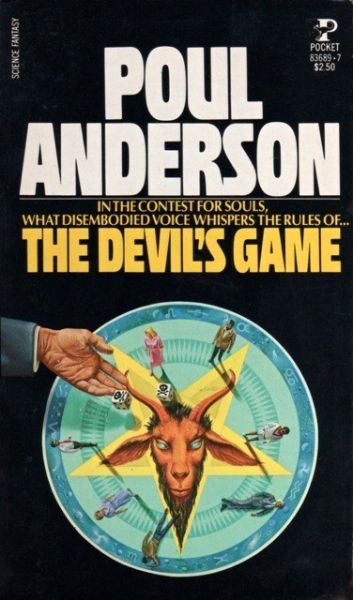Each Perfect Day
The Devil’s Game
By Poul Anderson

5 May, 2024
Poul Anderson’s 1980 The Devil’s Game is a stand-alone speculative fiction thriller.
Elderly Sunderland Haverner owes his fantastic wealth in small part to good luck in choosing ancestors, but in far greater proportion to the infallible advice of his unseen and seemingly immaterial advisor, Samael.
Sunderland gained wealth and status. Samael gained the means by which the entity could affect Sunderland’s material world. The partnership has served Sunderland well. The old man will not hesitate to carry out Samael’s latest task: a curious psychological experiment.
Julia Petrie, Gayle Thayer, Byron Shaddock, Lauritz Rance, Orestes Cruz, Ellis Nordberg and Matthew Flagler are a disparate collection. Whether they are a desperate, belated hippie, a failed mobster, a communist revolutionary, a would-be adventurer, a visionary businessman, or a would be Samaritan1, each needs money. Sunderland’s invitation to travel to tropical Santa Ana and compete for a prize of one million tax-free American dollars was irresistible.
The game itself is simplicity itself. Each participant will get to propose a contest of their choosing. Each task should involve some activity within all of the contestants’ abilities, presumably one at which the proposer feels they have an advantage. Those who fail to accomplish the task are eliminated. Whichever contestants are left at the end will split the million-dollar pot. Obviously, each share will be larger if fewer contestants survive elimination.
While tasks cannot have as their goal the deaths of one or more contestants — no duels to the death — the possibility of harm or death is permitted. Thus, it would be perfectly acceptable to propose a swim through dangerous currents or an eating contest involving a food to which one or more contestants are allergic. Or, as in the case of dark-skinned Orestes, simply standing in direct tropical sunlight for as long it takes his palest-skinned competitors to burn.
While each contestant would prefer to win the entire pot, one person against six would face serious odds. No surprise that alliances soon form, as contestants better their odds by convincing others that winning a small fraction of the money is better than getting none at all.
If only one faction or one contestant survives, that faction or person will get the prize. The murders should not have come as a surprise.
~oOo~
As you know, I was inspired to revisit this because of I was reminded of Brunner’s Players at the Game of People. Both titles include the word ‘game,’ but there are further parallels. Anderson’s protagonist Sunderland and Brunner’s protagonist Godwin have patrons whose natures are unclear and for whom the humans carry out tasks in pursuit of obscure goals.
Given the books’ publication dates, Anderson and Brunner must have been writing on similar themes simultaneously and in different nations purely by accident2. It’s just another one of those peculiar coincidences in which science fiction authors sometimes find themselves entangled. What is odd is that another Brunner book would show coincidental similarities with another publication, just a few years after Game was published. An interesting topic for another pair of reviews.
Unfortunately for the quality of the book under review, the Samael plot does not really go anywhere. Samael’s purpose remains unclear Perhaps as a result, the game itself seems poorly focused. (In this it is unlike the Brunner plot, in which it becomes clear that the protagonist’s patrons are self-serving and malevolent.) The author’s choices did, however, mean that this novel could be shelved in science fiction and fantasy rather than with mainstream fiction.
Even if uneven, The Devil’s Game seemed to me to be a worthy experiment on Anderson’s part to write something other than a straight-up adventure. Readers will learn about each of the characters’ interior lives. Each contestant has what they believe are justifiable motivations, motivations beyond simple greed, to do whatever it takes to win one million tax-free dollars3. The book does not devolve into Lord of the Flies, adult edition, because for the most part Anderson didn’t care to write those sorts of characters. In addition, most of the seven are able to empathize with each other.
The book isn’t entirely successful in other ways. Some internal monologues are too long; some dialogues are stilted. There are sex scenes which just don’t come off, as the puritanical Anderson was ill suited to write them. Nevertheless, one has to acknowledge Anderson’s ambition in attempting something unlike his previous (astonishingly vast) body of work.
The Devil’s Game is available here (Amazon UK) but appears to be otherwise out of print.
1: Despite much searching, I could only find motivations for six of the seven.
2: It would have been totally in character for Anderson to participate in a project in which a number of authors began with the same seed of “human makes a deal with something and there are consequences.” See, for example, Five Fates.
3: Some standard 1970s Anderson talking points about the folly of the welfare state do appear… uttered by Sunderland, who is not exactly a sympathetic figure.
